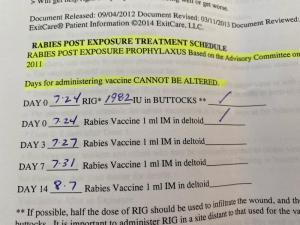Woman and her uncle attacked by fox near Rehoboth
Following a recent attack on herself and her uncle, a Rehoboth Beach woman is warning Junction and Breakwater Trail users of an aggressive fox, who is apparently not afraid of humans.
“It was horrible,” said Sally Marchegiano, describing the attack during an interview July 28. “It was like a Tasmanian devil, coming back twice. It was not scared.”
Marchegiano said she, her wife and her uncle had just sat down to eat some freshly grilled steaks July 24, when her wife pointed out a fox that had just appeared from the woods.
“Before I could even see what she was talking about, the fox attacked me,” said Marchegiano. “My wife thought I was being ridiculous.”
Marchegiano, who lives in a neighborhood between the popular bike trail and Giant Food supermarket, said just as quickly as it attacked her, the fox attacked her uncle. She said her wife grabbed a patio chair and began trying to hit the fox, but by this time her uncle and the fox were rolling around on the ground.
“It looked like a bad television show,” said Sally.
Eventually, Marchegiano said her wife was able to scare the fox away by spraying it with a hose for an extended period of time.
Marchegiano said the fox came back two days later. This time they were outside on the second floor deck as a precaution, she said.
The fox stayed visible for a few minutes, said Marchegiano.
“We know it’s the same fox because the tip of its tail is very black,” she said.
Marchegiano said since the attack she’s learned a neighbor feeds the local wild animals. She said she doesn’t think the fox has rabies because when it came back the second time, her wife was able to get a good look at it through a pair of binoculars.
Marchegiano may not think the fox has rabies, but as a precaution she and her uncle are getting the rabies vaccine. She said they’re halfway through the four-shot regimen. The first one hurt a lot because the shots go into and around the puncture wounds, she said.
Marchegiano said she and her uncle are doing better, but he’s still having trouble walking on the leg that was bitten by the fox.
“I just want to make sure people know about it,” she said.
In an email July 28, Michael Globetti, Delaware Department of Natural Resources and Environmental Control spokesman, confirmed the state parks received a report of a fox incident on a residential property near Cape Henlopen State Park. Wildlife, including numerous foxes, certainly exist in the state park, as well as on other area lands, he said.
Globetti said given the time lag from the incident to the report, even if foxes in the park were trapped, it would not be possible to know which, if any of them, was involved. Determining whether a fox or other animal has rabies can only be done if it is tested postmortem, he said.
Globetti said to report aggressive or threatening wildlife, call DNREC’s dispatch line at 800-523-3336.
Rabies information
Rabies is an infectious disease affecting the nervous system of humans and other mammals. The state’s Division of Public Health maintains a database of confirmed rabies cases. According to that database, found on the DPH website, there hasn’t been a confirmed rabies case due to a fox since 2018, when there were five. That same database shows, since 2010, raccoons, 40, and cats, 33, are the animals that have the most confirmed rabies cases.
DPH recommends that individuals take the following steps to prevent rabies exposure:
- All dogs, cats, and ferrets 6 months of age and older are required by Delaware law to be vaccinated against rabies by a licensed veterinarian.
- Pet owners can reduce the possibility of pets being exposed to rabies by keeping them indoors and not letting them roam free. It is especially important that pet owners who do allow their cats to roam outdoors vaccinate their pets.
- Do not touch or otherwise handle wild or unfamiliar animals, including cats and dogs, even if they appear friendly.
- Do not keep your pet's food or water outdoors; bowls can attract wild and stray animals. Do not feed feral animals, including cats, as the risk of rabies in wildlife is significant.
- Spaying or neutering your pet may reduce the tendency to roam or fight and, thus, reduce the chance they will be exposed to rabies.
- Keep your garbage securely covered.
- Consider vaccinating livestock and horses as well. It is recommended to consult with your private veterinarian if you have any questions regarding whether your animal(s) should be vaccinated against rabies.
- To report a sick or hurt wild animal, Delaware residents are asked to contact the state’s Wildlife Section at 302-739-9912 or 302-735-3600.
- DPH and the Office of Animal Welfare will visit the home of any person that has been bitten, scratched, or experienced contact with saliva or brain/neural tissues of a potentially rabid animal. This service is provided throughout the state. OAW can be contacted at 302-255-4646 or at delawareanimalservices@delaware.gov.
Chris Flood has been working for the Cape Gazette since early 2014. He currently covers Rehoboth Beach and Henlopen Acres, but has also covered Dewey Beach and the state government. He covers environmental stories, business stories and random stories on subjects he finds interesting, and he also writes a column called Choppin’ Wood that runs every other week. Additionally, Flood moonlights as the company’s circulation manager, which primarily means fixing boxes that are jammed with coins during daylight hours, but sometimes means delivering papers in the middle of the night. He’s a graduate of the University of Maine and the Landing School of Boat Building & Design.
























































